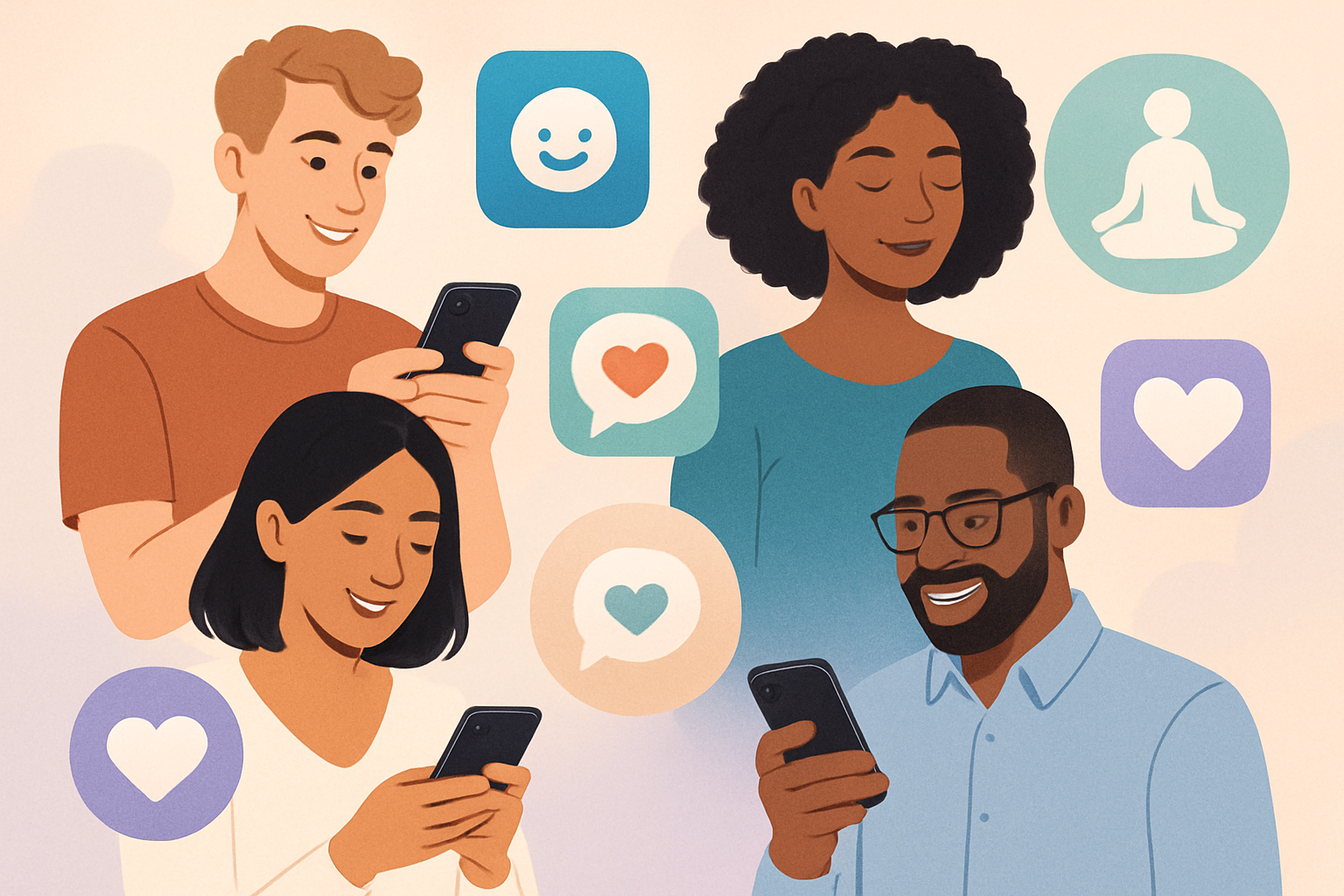The mental health app marketplace has evolved dramatically in 2025, offering powerful tools for emotional well-being, therapy, and self-care to people around the world. Whether seeking anxiety relief, meditation, evidence-based counseling, or tracking your moods, today’s leading apps are accessible, affordable, and often backed by clinical research.

Evolution of Mental Health Apps
Modern mental health apps now embrace AI-driven support, licensed therapist access, personalized routines, and comprehensive tracking tools. They focus on privacy, inclusivity, and flexible engagement, adapting to busy lives and diverse needs. Many blend self-help techniques with professional therapy, creating a unique “hybrid” model that allows users to interact with chatbot counselors or real therapists as needed.
Top Mental Health and Therapy Apps of 2025
Below is a curated list with standout features, strengths, and recommended uses:
1. Calm
- Best For: Meditation, relaxation, sleep improvement
- Features: Guided meditations, sleep stories, breathing exercises, soundscapes for stress reduction
- Pros: Extensive content, easy onboarding, premium sleep tools
- Cons: Most advanced features require subscription
2. Headspace
- Best For: Mindfulness practice, daily meditation
- Features: Guided sessions for stress relief, sleep, focus, plus mini-meditations for busy schedules
- Pros: User-friendly, customizable, large library
- Cons: More in-depth features behind paywall
3. Youper
- Best For: Personalized AI therapy, mood tracking
- Features: AI-driven therapy chats using CBT, ACT, DBT; daily emotional check-ins; progress tracking
- Pros: Adapts to individual needs, clinically validated (Stanford research), easy data review
- Cons: Subscription required for full access, regular use is needed for best results
4. Wysa
- Best For: 24/7 emotional support, hybrid AI + human therapist guidance
- Features: CBT tools, conversational chatbot, option to connect with licensed therapists
- Pros: Clinically backed, FDA-recognized, strong privacy, hybrid support
- Cons: Premium features cost extra, occasionally templated AI responses
5. BlueCall
- Best For: Secure video therapy with licensed professionals
- Features: Confidential remote video calls, licensed counselors for instant help with stress, anxiety, crisis
- Pros: Flexible scheduling, direct access to credentialed therapists
- Cons: Requires internet and device access
6. 7Mind
- Best For: Meditation for all levels, European audiences
- Features: Expert-curated guided meditation routines, sessions as short as seven minutes
- Pros: Backed by scientific research, multilingual options
- Cons: Not every feature available globally
7. Moodfit
- Best For: Mood tracking, habit building, emotional awareness
- Features: Custom symptom trackers, daily journal, insights for therapy support
- Pros: Free and paid versions, easy export for therapy discussions
- Cons: No in-app counseling
8. Bearable
- Best For: Mood and symptom tracking
- Features: Visual trackers for moods, habits, sleep, medications
- Pros: Clear graphs, easy daily inputs
- Cons: No human therapist option
9. Happify
- Best For: Positive psychology, emotional self-care
- Features: Interactive activities and games for resilience and happiness
- Pros: Gamified approach, science-based activities
- Cons: Limited therapy for complex conditions
10. MindShift CBT
- Best For: Anxiety management using CBT tools
- Features: Guided exercises and strategies for panic, phobias, perfectionism, social anxiety
- Pros: Evidence-based, easy navigation
- Cons: Does not offer live therapist support
Notable AI Mental Health Apps
AI apps such as Wysa, Youper, and new entries like ChatGPT, Sonia, and Yuna are empowering users to access personalized support instantly. These apps leverage cognitive behavioral therapy techniques, biometric tracking, daily reflection, and conversational guidance while respecting user privacy and regulating costs.
Specialized and Inclusive Apps
- Finch: Habit tracker with pet-style gamification
- Insight Timer: Extensive meditation library, popular for free mindfulness
- Breathe, Think, Do: Child-focused, ideal for parents seeking emotional wellness tools
- How We Feel: Emotional journaling with visual emotion wheels, great for therapy clients
Making the Most of Mental Health Apps
To maximize the benefits, choose an app that suits specific needs:
- For emotional support: Try Wysa, Youper, or BlueCall
- For meditation: Calm, Headspace, 7Mind, or Insight Timer
- For mood tracking and self-care: Bearable, Moodfit, Happify, Finch
- For anxiety and CBT: MindShift CBT, MoodMission
- For children and families: Breathe, Think, Do
Consistency and engagement—daily mood tracking, meditation, and regular progress reviews—can produce measurable improvements in well-being.
Privacy and Clinical Backing
Most top apps invest in secure data storage, anonymous usage options, and clinical validation. Review privacy policies and clinical research before sharing sensitive personal information. Many are now FDA-recognized or recommended by therapists, providing users assurance of safety and effectiveness.
Conclusion
Mental health apps in 2025 are more than simple digital diaries—they’re sophisticated tools blending mindfulness, therapy, education, and behavior change for people worldwide. Whether looking for daily support, crisis management, meditation, or therapy—there is a proven app to guide every mental wellness journey.



